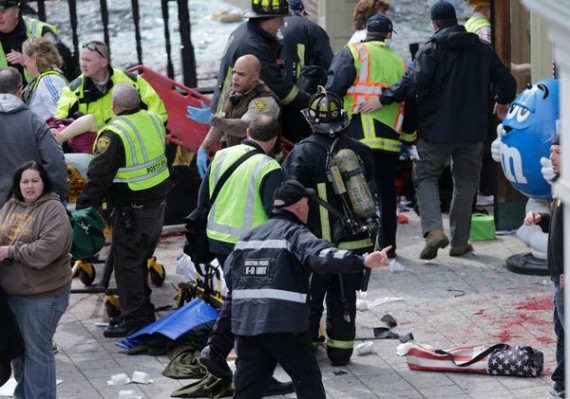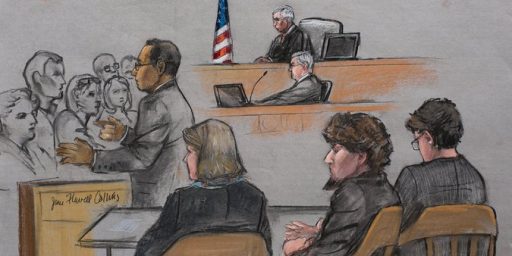FBI Review Says That Boston Bombing Could Not Have Been Prevented
In the end, it doesn't appear that the Boston Marathon bombings could have been prevented by law enforcement.
An internal review by the Federal Bureau of Investigation concludes that the agency would not have been able to stop April’s bombing at the Boston Marathon based upon the information that was available to it prior to the attack:
WASHINGTON — The F.B.I. has concluded that there was little its agents could have done to prevent the Boston Marathon bombings, according to law enforcement officials, rejecting criticism that it could have better monitored one of the suspects before the attack.
That conclusion is based on several internal reviews that examined how the bureau handled a request from a Russian intelligence agency in 2011 to investigate whether one of the suspects, Tamerlan Tsarnaev, had been radicalized during his time in the United States.
Mr. Tsarnaev, who along with his brother, Dzhokhar, came to the United States about a decade ago from the Russian republic of Dagestan, was killed during a shootout with the police four days after he and his brother detonated two bombs at the finish line of the marathon, killing 3 people and injuring more than 200, the authorities say.
Members of Congress have contended that the F.B.I. should have done a more extensive investigation of Mr. Tsarnaev in response to the Russian request. And they have said the bureau should have followed up with Mr. Tsarnaev after he returned from a trip to Russia in 2012.
But F.B.I. officials have concluded that the agents who conducted the investigation and ultimately told the Russians that there was no evidence that Mr. Tsarnaev had become radicalized were constrained from conducting a more extensive investigation because of federal laws and Justice Department protocols. Agents cannot use surveillance tools like wiretapping for the type of investigation they were conducting.
The officials have also determined that had the agents known that Mr. Tsarnaev had traveled to Russia for months in 2012, they probably would not have investigated him again because there was no new evidence that he had become radicalized.
(…)
The F.B.I. first learned that Mr. Tsarnaev may have been radicalized in early 2011, when Russian intelligence officials sent a letter to F.B.I. agents stationed at the American Embassy in Moscow. The letter, according to the F.B.I., said that “he was a follower of radical Islam and a strong believer, and that he had changed drastically since 2010 as he prepared to leave the United States for travel” to Russia to join a terrorist group.
The letter prompted the F.B.I. to open an investigation in Boston. As part of that inquiry, counterterrorism agents looked at Mr. Tsarnaev’s criminal, education and Internet histories and found little that made them suspicious.
That April, F.B.I. agents interviewed Mr. Tsarnaev’s parents, and shortly thereafter they interviewed him and found nothing suspicious. Two months later, the agents closed the investigation of Mr. Tsarnaev, determining that they could not find any information linking Mr. Tsarnaev to extremists or extremist beliefs.
The F.B.I. went back to the Russian intelligence service to request more information on Mr. Tsarnaev but was not sent anything, according to bureau officials. The F.B.I. made another request in 2011, but the Russians once again did not send any information.
Mr. Tsarnaev did not show up again on the F.B.I.’s radar until four days after the bombings, when his body was identified at a Boston-area hospital after the shootout. Several hours later, the F.B.I. discovered in its files that it had investigated him in 2011.
It is unclear whether the F.B.I. was informed by the Department of Homeland Security in 2012 that Mr. Tsarnaev had returned from his trip to Russia.
Shortly after realizing that there was no formal way of notifying agents that someone they had investigated may have been traveling outside the United States, the F.B.I. and the Department of Homeland Security changed their procedures so that agents are given written notification that someone they investigated had traveled abroad.
While these changes are likely to streamline information sharing in the future, one law enforcement official said that “it’s fair to say that had these adjustments been in existence before the attacks, the outcome would likely not have been any different.”
It seems unlikely that this internal review will be enough to satisfy the critics who sprang up in the immediate aftermath of the bombing and the identification of the Tsarnaev brothers as the perpetrators of the attack. Partly, of course, there will be political motivations causing some to question the sufficiency of the Obama Justice Department’s counter-terrorism and investigation procedures, but there’s also likely to be an element of 20/20 hindsight in the criticism as well. After an event like this, it’s easy to see the connections between certain events and a tragic event like the bombing on April 16th. In this particular case, we’ve learned many things about the Tsarneav brothers since Tamerlan was killed and Dzhokkhar was captured that, taken together, paint a picture of increased radicalization on the part of both men. Many of those elements are discussed in the controversial Rolling Stone cover story about Dzhokhar that was published last month.
There’s a difference, however, between looking at the facts of a case in hindsight, and trying to understand what else law enforcement might have been able to do with the information that it had prior to the attack. We know, for example, that the FBI had some kind of a vague warning from Russia regarding Tamerlan Tsarnaev. This warning actually came before Tamerlan had traveled to Dagestan and, according to some sources, made contact with radical and terrorist elements there. While we don’t know the content of the information that the Russians provided, we do know that it was sufficient to cause the FBI to investigate Tamerlan and to send agents to speak with both him and his family on several occasions before closing the matter. One can argue that law enforcement should have kept Tamerlan Tsarnaev on their radar after this, but without any kind of concrete information linking him to some kind of illegal activity its unclear what legal justification there would have been to do so. Additionally, it appears from the reports that have come out that the Russians didn’t provide a lot of detail regarding the basis for their “heads up” regarding Tsarnaev, and didn’t respond to requests for further information. Perhaps if they had done so, there would have been a sufficient legal basis for further surveillance, but based on the information that the FBI had at the time its fairly clear that they did everything they could with the information that they had.
Based on what we’ve learned so far, it appears that the Tsarnaev brothers were perhaps the first real example of something that law enforcement and intelligence officials have been concerned about ever since the September 11th attacks, the lone wolf domestic terrorist. Outside of whatever it is that Tamerlan may have learned during his visit to Dagestan in 2012, there has been no real evidence produced that the Tsarnaev brothers had any contact with foreign terrorist groups, or that they were operating under the direction of anyone other than themselves. They appear to have obtained all the information they needed about bomb construction from the Internet, and all the materials they needed from conventional domestic sources (the explosives that were used in the attack were apparently obtained from fireworks purchased at a store in New Hampshire, for example). Nobody who claims to have known them prior to the attacks has said that there was any indication that they were even capable of something like this attack, and there’s no evidence that they communicated about it in any manner that law enforcement would have been able to detect. The only way there would have been any clue about what these two men were plotting would have been if one of them had made a mistake that would have tipped some observant person off that would have led to a police inquiry. Since that didn’t happen, it’s not clear that anything could have been done to prevent what happened on April 16, 2013. In some ways, that’s even more worrisome than the possibility that our intelligence and law enforcement agencies missed something that would have tipped them off to an attack.





No comment on the post, but the picture with the blue M&M… wow. Product placement can be unfortunate.
This is perhaps the first case where a “domestic terror plot” was not part of an FBI sting operation and they missed it. Doesn’t leave me with a lot of confidence.
It was Obama’s fault.
BENGHAZiiiii!!!!!
Kaczynski (1987-1995)
McVeigh (1995)
Rudolph (1996)
Wade Michael Page (2012)
If lone wolf domestic terrorism is something “law enforcement and intelligence officials have been concerned about ever since the September 11th attacks”, they’re a bit behind the curve. Political institutions are like magpies. They’re completely focused on whatever they’re focused on until the next shiny object comes along.
I think it’s partially explainable by career path issues. Until 2001 terrorism just wasn’t an area that an ambitious law enforcement officer or prosecutor dedicated him or herself to. Drug enforcement or even white collar were more glamorous. After 2001 investigation and prosecution of foreign terrorism became a growth industry.
These institutions are inherently reactive so we shouldn’t be too surprise when they fail to prevent and, indeed, are convinced that prevention is impossible.
@Dave Schuler: Kaczynski (1987-1995)
McVeigh (1995)
Rudolph (1996)
Wade Michael Page (2012)
Let’s correct and expand that list a little:
Timothy McVeigh: Two conspirators. Attempted to recruit at least one more.
DC Snipers: two men.
Fort Hood shooting: one man, with long contacts with Al Qaeda members.
Times Square bomber: One man. with ties to otehrs in Pakistan.
1993 WTC bombing: Al Qaeda.
Underwear bomber: Al Qaeda stooge.
Shoe bomber: Al Qaeda stooge.
Little Rock military recruiter shootings: One man, claimed Yemeni and Al Qaeda ties.
There’s something that ties all these together, but I can’t quite put my finger on it…
@Jenos Idanian #13:
If the Tsarnaev brothers count as “lone wolves”, I would think that so do Timothy McVeigh and the DC snipers.
@Dave Schuler:
Fair point. I suppose I should qualify that by saying I was referring to lone wolf terrorist attacks inspired, albeit not directed or controlled, by al Qaeda or similar organizations.
so in essence, it’s really not that hard to kill/maim a whole bunch of people if you really want to?
Would just point out the sentence in the Original Post: “The only way there would have been any clue about what these two men were plotting would have been if one of them made a mistake that would have tipped some observant person off that would have led to a police inquiry.”
And I’d then relate that to the post by Our Gracious Host: “Google Searches for “Pressure Cooker” and “Backpack” lead to FBI Visit” wherein it was determined that an observant person did make a police call that led to an Anti-Terrorism Task Force inquiry. So maybe we’re a little better off that we were before the Patriot’s Day Bombing?
The FBI restrained by laws???? Maybe Snowden should be asked to comment.
This tragedy was avoidable if someone had bothered to follow up in 2011. They must have made phone calls.
Happy to see, however, that Obama declared the war on terror over after the incident.
We live in a country of oxymorons.